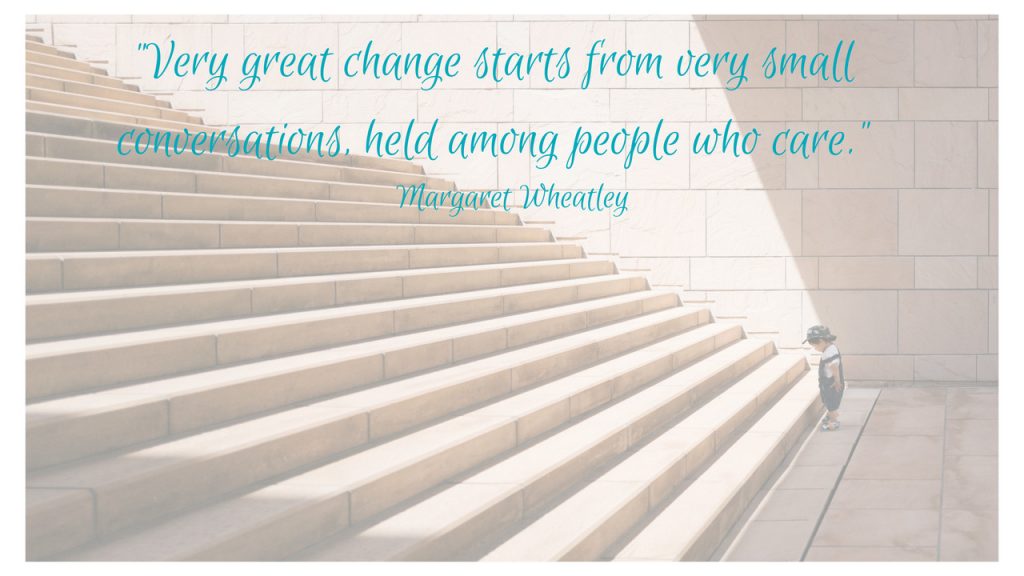Introduction
This past weekend I was having a conversation with someone at the stables where I ride. We were chatting about conversations with horses, believe it or not. I ride a couple of horses, and recently started riding the same horse that she does. His name is Fruitloop, and he is a sweet guy with his own little quirks. We were sharing a bit about his personality and what works and doesn’t with him.
She then said something so blindingly obvious to me, given the work I do. She said, “When riding and building a relationship with a new horse, it means a different conversation.” I was like “duh, yes… to myself.”. I realized that he and I were speaking and listening to each other. Actually at times it felt like I was shouting at him and he at me. Thankfully that is not the bulk of our conversation and I keep reminding myself to use what I’ve learned in my work with my relationships with all sentient beings.
What makes for a good conversation?
From an Ontological perspective, there are four crucial areas that make for good conversations. These are our moods, our listening, our speaking, and our physiology. Each of these play a key role in whether we are exquisite conversationalists or not, and being able to separate them out and examine them can be very helpful.
Being with and riding horses is a continual reminder for me to pay attention to the tone and mood of my conversing. What do I mean by that? A crucial part of a good conversation is to manage my own mood and come from a place of acceptance and care. This, instead of irritation and annoyance, which can sometimes be present before I know it. Being able to be aware of my mood and be able to change it, means the conversation has a much greater chance of success.
The next part is listening to how I am listening. For example if my listening is that Fruitloop is being naughty, then guess what I will do? I will treat him as if he is being naughty and then he will respond in turn and the conversation could get a bit heated. Being able to listen to my listening and interrupt unhelpful patterns and habits are very important so that I can attune to what matters to the other sentient being, and adjust as necessary.
When speaking, being able to share my thoughts and what’s important and at stake for me is equally important. In the case of Fruitloop how does he know what I am asking if I am not clear in my requests and also in responding to his requests. For example if he is going to fast for me, then I want to be able to say whoa! And, he may want to say, “Hey, you are holding those reins a bit tight!”. All very important aspects of our communication with each other.
Lastly, and this is very important when riding, is my physiology. If I am uptight and stiff, my communication is compromised. Fruitloop is likely to freak out thinking there may be a lion in the bush. And who could blame him. At that stage I may think so too. Being centered and relaxed means I can be more fluid and have more choices available to me, and by extension Fruitloop. Much better than having lions lurking in the background!
What does this have to do with conversation with humans?
If you think about it, the conversations we have with other humans is exactly the same. How we are in our Way of Being, includes moods, listening, speaking and physiology. And these play a vital role in our conversations with each other.
Each of these inform the quality of our conversations . So, this is important because the way we shape, create and generate reality is through our conversations with each other. To have the best possible chance of success,which includes achieving outcomes, being influential, and building effective relationships, paying attention to the quality of our conversation just makes good sense. It can make the difference between us being exquisite conversationalists through to average and even inept.
Over to you
Perhaps one or two things have become a little more clear to you, and you have some areas to explore how you could enhance the quality of your conversations, and with it relationships. And in closing I’d like to offer some questions for you to consider, which may support you in thinking about your conversational capacity further:
- What is your prevailing moods in conversations? Generally? In a business context? With those you care about? How do these moods shape what does and doesn’t happen?
- When do you listen to what is important to others? How do you know? What impact does it have?
- When are you clear in your communication? How does that inform your results and relationships?
- What is happening in your physiology in important conversations? Where could you adjust your body, breathing and posture to greater effect?

